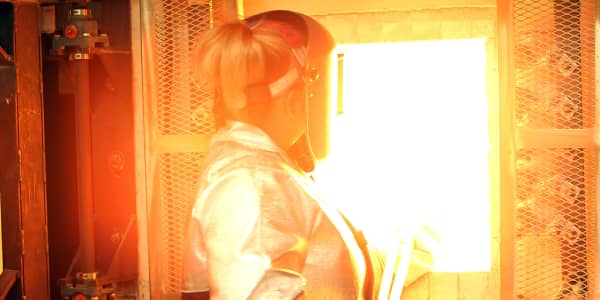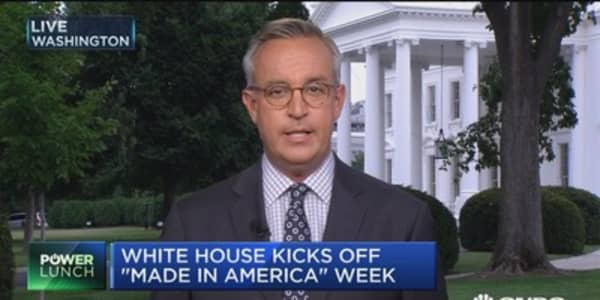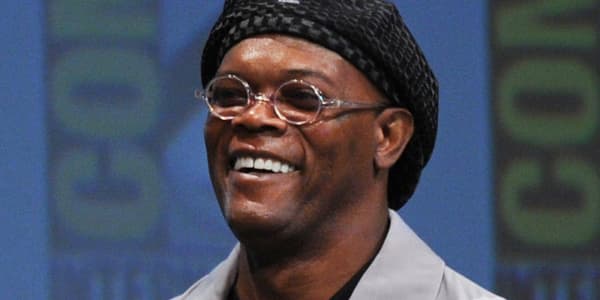
You will find an ice bucket in every hotel room, but you have probably never given it much thought. Unless you're Fred Haleluk, the CEO and president of Mr. Ice Bucket, a New Brunswick, New Jersey-based company that manufactures ice buckets in the United States.
For 50 years, Mr. Ice Bucket has been the oldest continuously managed ice bucket manufacturing facility in the world. Its claim to fame: They use only local U.S. artisans, who are passionate about churning out a high-quality product.
And high-end hotel chains are their biggest customer. If you have stayed at well-known hotels such as the Venetian, Trump properties or Marriott, you may find the smiley Mr. Ice Bucket logo on the bottom.
"We sell between 150,000 to 210,000 ice buckets in a year ... and most of the volume comes from the hotel industry," Haleluk said. His company brings in more than $7 million in sales, with ice buckets retailing between $20 and $75.
We've been promoting 'Made in America' big-time. We go out of our way to say it. In the beginning, nobody cared, really. But I can say in the last three years, people care.Fred HalelukCEO and president of Mr. Ice Bucket
In 1965, when Haleluk founded Mr. Ice Bucket, he had 13 competitors in the U.S. After buying out seven of his competitors, including Lancaster Colony's ice bucket division, Haleluk now owns one of the only two companies to manufacture ice buckets in the country. He told CNBC he controls about 50 percent of the U.S.-made market.
But about a decade ago Mr. Ice Bucket started to see sales melt as overseas imports, especially from China, started entering the market, at a much lower cost.
Haleluk said the quality of these imports simply does not compare to his company's. "The quality is like night and day. I never worry about a Chinese product at all. It's when I have to sell on price that we can't sell on price at all," Haleluk told CNBC.
Read MoreAn outfitter says good-bye to the Letterman show
In fact, the new push for Mr. Ice Bucket is to expand into more retail stores after Wal-Mart and Target stopped carrying the brand after they were undercut by imports from China.
Approximately 60 percent of Mr. Ice Bucket's sales are to hotels and 30 percent to retail stores, including Nordstrom and online retailer Amazon.
Freezing out overseas competition
To put a chill on the overseas competition, Mr. Ice Bucket began promoting the "Made in America" aspect of its operations over the past decade. But it's not just a logo—there are logistical advantages for customers as well.
Because the raw materials, such as vinyl and cardboard, are sourced from the U.S. and manufacturing is done at two factories in the U.S.—one in New Brunswick, New Jersey, and the other in Jackson, Ohio—customers can get their ice buckets quickly. "We can manufacture a bucket and send it out the same day if we have to," Haleluk said.
The quick turnaround time is especially helpful for hotel customers, because due to hotel budgets, ice buckets are often one of the last things ordered, Haleluk said. "We do more rush orders for hotels, I think, than any product out there. All of a sudden we'll get a call and they say, 'Can you make 423 ice buckets and get them to us within five or six days?'"
There's another reason that ice buckets are always in high demand among hotel customers.
"We found that the more popular or prestigious the hotel is … that people take the ice bucket as a souvenir. ... They're the type of hotel that gives us a lot of repetitive business," Haleluk said.
Mr. Ice Bucket is now starting to see more retail business and he's even been invited back to show his product to Wal-Mart and is hopeful that the retail giant will make an order.
"We've been promoting 'Made in America' big-time. We go out of our way to say it. In the beginning, nobody cared, really. But I can say in the last three years, people care," Haleluk said.





